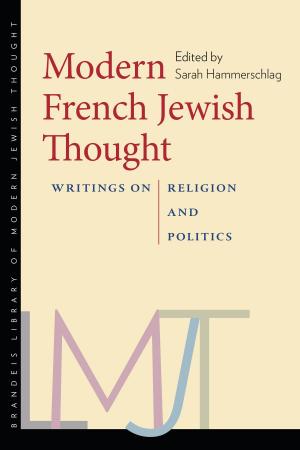Jewish Rhetorics
History, Theory, Practice
Fiction & Literature, Literary Theory & Criticism, Jewish, Nonfiction, Reference & Language, Language Arts, Public Speaking, Rhetoric, Social & Cultural Studies, Social Science| Author: | ISBN: | 9781611686418 | |
| Publisher: | Brandeis University Press | Publication: | December 2, 2014 |
| Imprint: | Brandeis University Press | Language: | English |
| Author: | |
| ISBN: | 9781611686418 |
| Publisher: | Brandeis University Press |
| Publication: | December 2, 2014 |
| Imprint: | Brandeis University Press |
| Language: | English |
This volume, the first of its kind, establishes and clarifies the significance of Jewish rhetorics as its own field and as a field within rhetoric studies. Diverse essays illuminate and complicate the editors’ definition of a Jewish rhetorical stance as allowing speakers to maintain a “resolute sense of engagement” with their fellows and their community, while also remaining aware of the dislocation from the members of those communities. Topics include the historical and theoretical foundations of Jewish rhetorics; cultural variants and modes of cultural expression; and intersections with Greco-Roman, Christian, Islamic, and contemporary rhetorical theory and practice. In addition, the contributors examine gender and Yiddish, and evaluate the actual and potential effect of Jewish rhetorics on contemporary scholarship and on the ways we understand and teach language and writing. The contributors include some of the world’s leading scholars of rhetoric, writing, and Jewish studies.
This volume, the first of its kind, establishes and clarifies the significance of Jewish rhetorics as its own field and as a field within rhetoric studies. Diverse essays illuminate and complicate the editors’ definition of a Jewish rhetorical stance as allowing speakers to maintain a “resolute sense of engagement” with their fellows and their community, while also remaining aware of the dislocation from the members of those communities. Topics include the historical and theoretical foundations of Jewish rhetorics; cultural variants and modes of cultural expression; and intersections with Greco-Roman, Christian, Islamic, and contemporary rhetorical theory and practice. In addition, the contributors examine gender and Yiddish, and evaluate the actual and potential effect of Jewish rhetorics on contemporary scholarship and on the ways we understand and teach language and writing. The contributors include some of the world’s leading scholars of rhetoric, writing, and Jewish studies.















